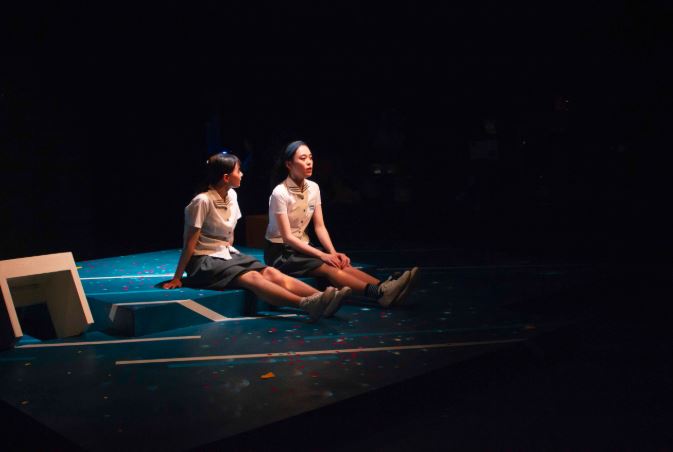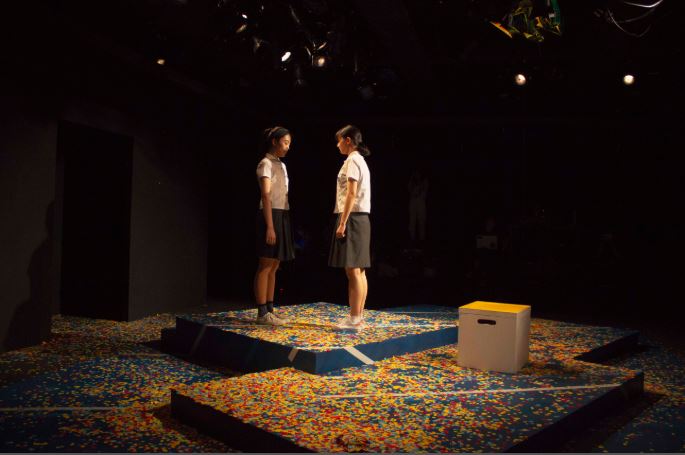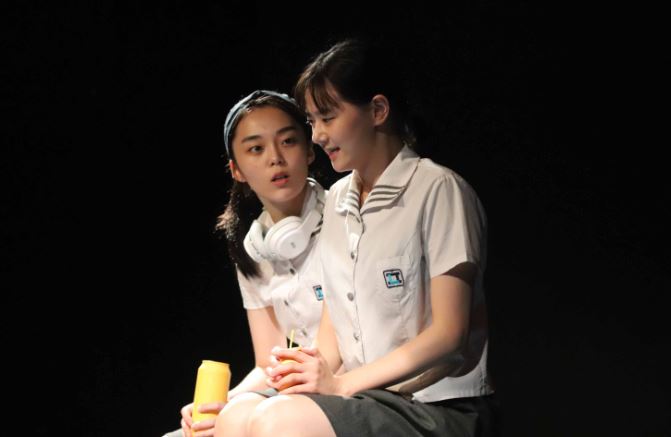A white school uniform blouse and a blue skirt. This is one of common looks of middle school students' summer uniforms. These students look cheerful and energetic with dreams in their hearts. There is a play that brings these characteristics together and describes them as ‘mackerel’. It was the play <Mackerel>, which was performed as an extra-curricular performance by Chung-Ang University's Department of Theater. What message does the play send to the people who were and are ‘mackerel’?
1. Synopsis
Ji-ho is an ordinary middle school student. Her best friend is her diary as she hesitates to speak out what she really feels. Gyeong-ju, on the other hand, has the opposite personality to Ji-ho. Ji-ho envies Gyeong-ju, who looks like she doesn’t care what others think. Then Ji-ho finds the courage to write a letter to Gyeongju, and finally the two become friends. One day, however, there is rumor about Gyeong-ju going around. They get away from the rumor and go to Noryangjin Fish Market. There, Ji-ho and Gyeong-ju decide to travel to Tongyeong to see the living mackerel, not just the mackerel in fishtank of the market.
2. Characters
Ji-ho: 15 years old Ji-ho is the same as a desk and chair in the classroom. Rather than revealing her existence, she just lives quietly in her everyday life. The only way for Ji-ho to express her feelings is in her diary. However, these days, Ji-ho cannot stand what she wants to say as she used to be able to do.
Gyeong-ju: Her long straight hair and white, smooth-skin look like a mackerel. Although she always looks chic with her headphones on, she is actually blocking out the world around her As Gyeong-ju cannot join school nor family, she feels confused about her existence.
3. Two, Trapped in a Tank
Ji-ho and Gyeong-ju are expressed as mackerel trapped in tanks. The two, who have to swim in the vast ocean, are tied to their daily lives and trapped in it. Their everyday life is like a small tank to them. Besides, the tank they stay in is not so peaceful. Silence the classroom stifles them, and the gossip from their friends makes them wither away like grapes in the scorching sun. Ji-ho has lived a quiet life. When Ji-ho saw some friends gossiping about other friends or found something small but happy, Ji-ho wrote her feelings into a secret diary instead of speaking them aloud. The silence has been forced to her and has become her daily routine. That's why Gyeong-ju is Ji-ho’s idol. Ji-ho envies Gyeong-ju, who said what she wants to say. However, Gyeong-ju has been blocking out the rumor about her with her headphones. The rumor spreads and spreads, weighing down on her mind.
This can be a situation that anyone could have experienced or been experiencing. However, breaking rumors and silence is very hard, and there must be consequences. Therefore, rather than jumping over and escaping the tank, we have passed the situation by looking for our own defense as Ji-ho and Gyeong-ju did, such as a diary or headphones. However, for 15-year-old Ji-ho and Gyeong-ju, who are like mackerels, it's hard to put up with it anymore. They start to spit out words that they have endured like a cough.

4. The Meaning of Being Alive
“What is it to be alive?” With Ji-ho’s letter to Gyeong-ju, the two became friends, but bad rumors about Gyeong-ju begin to spread. To avoid the rumors, they run away and arrived at Noryangjin Fish Market. There, thinking of the mackerel trapped in a tank, Gyeong-ju asks Ji-ho the meaning of being alive. Then, they decide to leave for Tongyeong on a whim to see mackerel in their natural environment.
Gyeong-ju says mackerel cannot be truly alive in the tank. The mackerel that lives in the tank with anesthetic is neither dead nor alive. To be truly alive is, after all, to be a struggle. The captain of the mackerel catch ship tells the two teenagers that the mackerel is the one who has become that struggle. The play illustrates the struggle of the two girls. From the moment they tried to get away from their daily routine, their struggle began. As they left for Tongyeong on a bus, they gradually moved away from their daily lives, and the moment they released the live mackerel, the struggle would finally be themselves. The meaning of ‘being truly alive’ would be the process of finding out that ‘I’ am still alive. As Gyeong-ju says, "Now I am here," we can see that they're no longer buried in their daily lives.

5. Go for One’s Own Sea!
Facing mackerels in the sea, the two each move toward their own seas. For Gyeong-ju, Tongyeong becomes her new sea. Since it might be where she felt alive, Gyeong-ju chooses to stay in Tongyeong. For Ji-ho, on the other hand, going back to the sea means going back to her everyday life. The previous reality was a tank, but Ji-ho is no longer a mackerel living under anesthetics. Ji-ho, which went back to Seoul alone, but is not really alone. She is not swayed by others but acting her own way. As such, the meaning of the sea varies from person to person. It would be a growth for Ji-ho, and a new start for Gyeong-ju. For sure, however, they're both alive now!
The play <Mackerel> reminds us of memories when we were teenagers. 15-year-old mackerels stuck in silence and gossip are described as two girls, Ji-ho and Gyeong-ju in this play. The story of the two looking for their own seas brings out similar experiences in our memory. How was your time as a mackerel? The <Mackerel> gives the audience opportunity to think about the question.

Kwak Da-eun
dashineshere@cau,ac.kr

